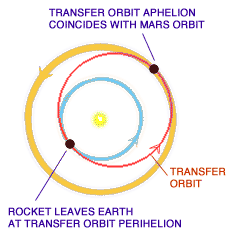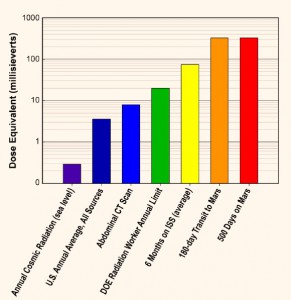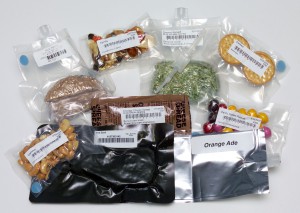Trip to Mars (Distance)
It will take around 7 months to travel to mars. Astronauts that stay/work at ISS (International Space Station) spend less time at ISS than the planned flight. It’s a bit of problem because humans are not adapted to the gravity. Because of that trip to mars is going to be one way ticket. Astronauts that will flight to Mars will never come back to the Earth. It’s hard to calculate the duration of journey because Mars and Earth’s orbits are not perfectly circular. Every two years Mars and Earth reach their closest point, called “opposition”.
Radiation
Radiation is very big obstacle for humanity to colonize mars. Based on radiation level we can take next step which is planning of human and robotic missions. With big help of spacecraft missions we are able to determinate the level of radiation on mars. The “Mars rover Curiosity” calculate and average does over the 180 – day journey. It’s around 300 mSv, the equivalent of 24 CAT scans. Just trip from Earth to Mars which will took around 180 days will exposed astronauts 15 times an annual radiation limit for a worker in a nuclear power plant.
Gravity
Spaceflight missions of extended duration result in astronaut de-conditioning, include a decrease in muscle mass and performance, reduced aerobic capacity, and losses in bone density, in addition to a host of other physiological changes. When Mars One astronauts arrive on Mars (62% less gravity than Earth), they would be stronger compared to an astronauts returning to Earth’s gravity after a mission of similar duration.
Oxygen, Water and Food
Astronauts that will flight to Mars will be send there for unspecified period of time. It’s not easy to send all necessary products to Mars. It will took around 200 days +/- for spaceship to reach Mars with any product. That’s why astronauts will need to produce everything on Mars. On Mars water can be extracted from the soil. Oxygen can be produced by splitting water into its constituent parts, hydrogen and oxygen. The storable food will be send to Mars. When astronauts will arrive on Mars that food will be waiting for them. But that storable food will only serve as emergency rations. Astronauts will try to eat as much fresh food that they produce on Mars as possible.
Technology
Our existing systems are not that different than the one we need to use on mars to survive. All the hardware needed for this missions still need to be designed, built and tested but the technology exists. All equipment will be developer by third party suppliers and integrated in their established facilities. Mars One visited all major aerospace companies around the word to discuss the requirements.






